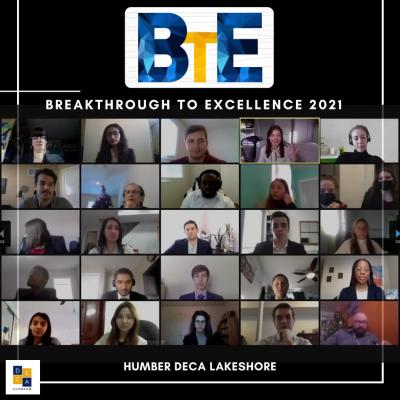
#HumberTogether: For the first two weeks of March leading up to the anniversary of campus closures due to COVID-19, Humber Today will publish stories showcasing the exceptional efforts of various departments, clubs and individuals over the last 365 days as part of a #HumberTogether Series.
Humber College’s DECA chapter isn’t your average club. For Devan Shingadia, a third-year student in Humber’s Bachelor of Commerce – Digital Business Management program, the extra-curricular activity has been integral to creating connections and opportunities in real life that will have a lasting impact on his career.
When COVID-19 started to affect gatherings and activities at Humber, he began to worry that others would not get the chance to experience the program and its benefits.
DECA is a not-for-profit student organization that allows post-secondary students to compete against each other at business conferences and prove their prowess in marketing, finance, hospitality and management.
Student participants at DECA conferences complete case studies individually or as a pair and are judged by a panel of professionals and industry partners.
They have less than an hour to review a real-life business plan and present a case study to the judges, then the top 3 are chosen.
Humber’s chapter, based at the Lakeshore campus prior to COVID-19, was relaunched in 2019. Shingadia, co-president of the club, was working with the executive team to plan an in-person conference at Humber to showcase the college, its programs and students skills. They called the event “Breakthrough to Excellence.”
In March, he and the other executives, Olivia Klimek, Grace Cornell, Janvi Soni and Mushfiq Mawla, had to rethink their plans. Not only would their conference be the first to be hosted at Humber College – it would also be the first online DECA competition for most of its participants.
From the ground up
Prior to the conference, Shingadia and his team were informed that, due to COVID-19 related cuts, the DECA club could be jeopardized, so they did what business students do and sought out their own funds.
They reached out to potential judges from the Humber community and beyond, including alumni, professors, marketing agencies and others with a variety of different viewpoints and skills. Once they secured the people, they managed to line up a sponsor.
“Traditionally, sponsors come to the school the day of the event and provide pamphlets or resources to students to help them with opportunities or skills. There are representatives from RBC, even Red Bull that come in and give freebies and goodies,” said Shingadia.
While the virtual platform wouldn’t accommodate traditional sponsorship, the club found a way to connect with a new sponsor.
“I made a connection last year at a conference and one of the workshop presenters told me CPA Ontario was looking for student groups to help. I was able to get in contact with a representative, discussed our intention for the club, and we were actually able to start a budget with the $300 we received from them,” he said.
There is potential for continuous funding over the next few years, allowing the club to upgrade their Zoom account and purchase prizes for the winners. Humber’s DECA team was already coming back strong – and the conference hadn’t even begun.
“COVID-19 has thrust us five years into the future”
Part of the draw of DECA conferences are the opportunities for networking and in-person connection with employers, classmates and students in other academic disciplines. Recreating a social environment would be a challenge.

The club, supported by faculty, embraced the virtual delivery necessitated by the pandemic and focused on hosting a successful conference, recreating a feeling of connection even if they couldn’t replicate the environment.
“I firmly believe that COVID-19 has thrust us five years into the future, into a situation that would have unfolded on its own anyway - it just didn’t take that long,” said Anke Föller-Carroll, a professor in the Tourism – Travel Services Management program. She worked closely with the Business students to support their work on the conference.
“The silver lining to our online learning situation is that our students grow up with the skill of making online connections and curating their networks at the same time when even the most seasoned industry veterans are developing their virtual networking practices,” she said.
In addition to their latest success kickstarting an annual conference, Humber DECA members have brought back many medals and top rankings from other conferences.
Last year, Shingadia placed first in the Food and Restaurant Management category at the Schulich School of Business conference. After the win, he reflected on the experience and noted that Humber students brought something different to the competition than students from other schools.
“The professors at Humber have been able to teach us in a way that we can apply to real life, beyond analytical theories,” he said.
“By giving our students a chance to go ahead and present what they’ve learned – it feels good seeing that. Our students are just as capable of winning.”
The Canada-wide DECA Nationals conference was held one week after Humber’s conference. Shingadia says the experience paid off when one Humber delegate secured a Top 5 position in the Tourism category.
